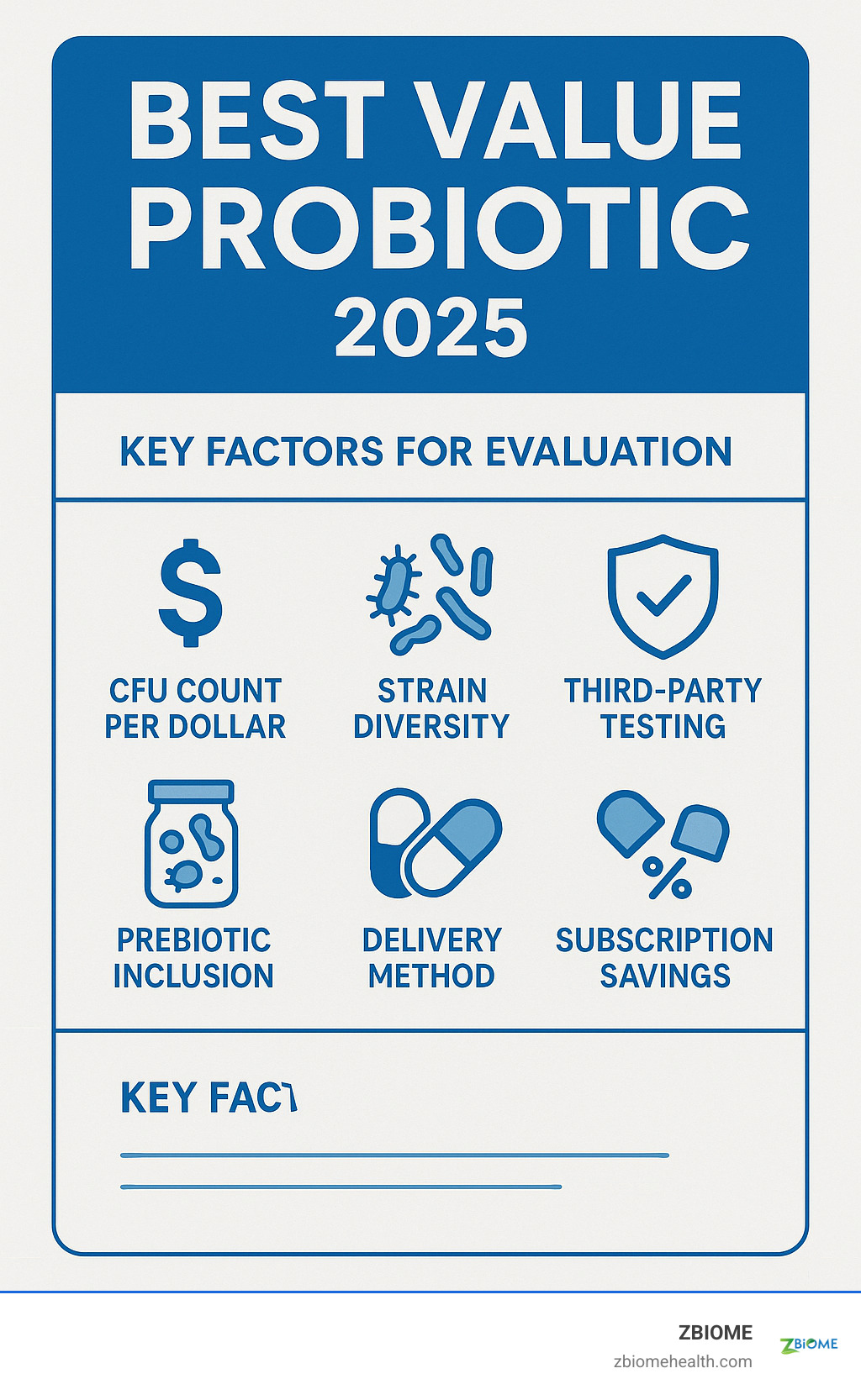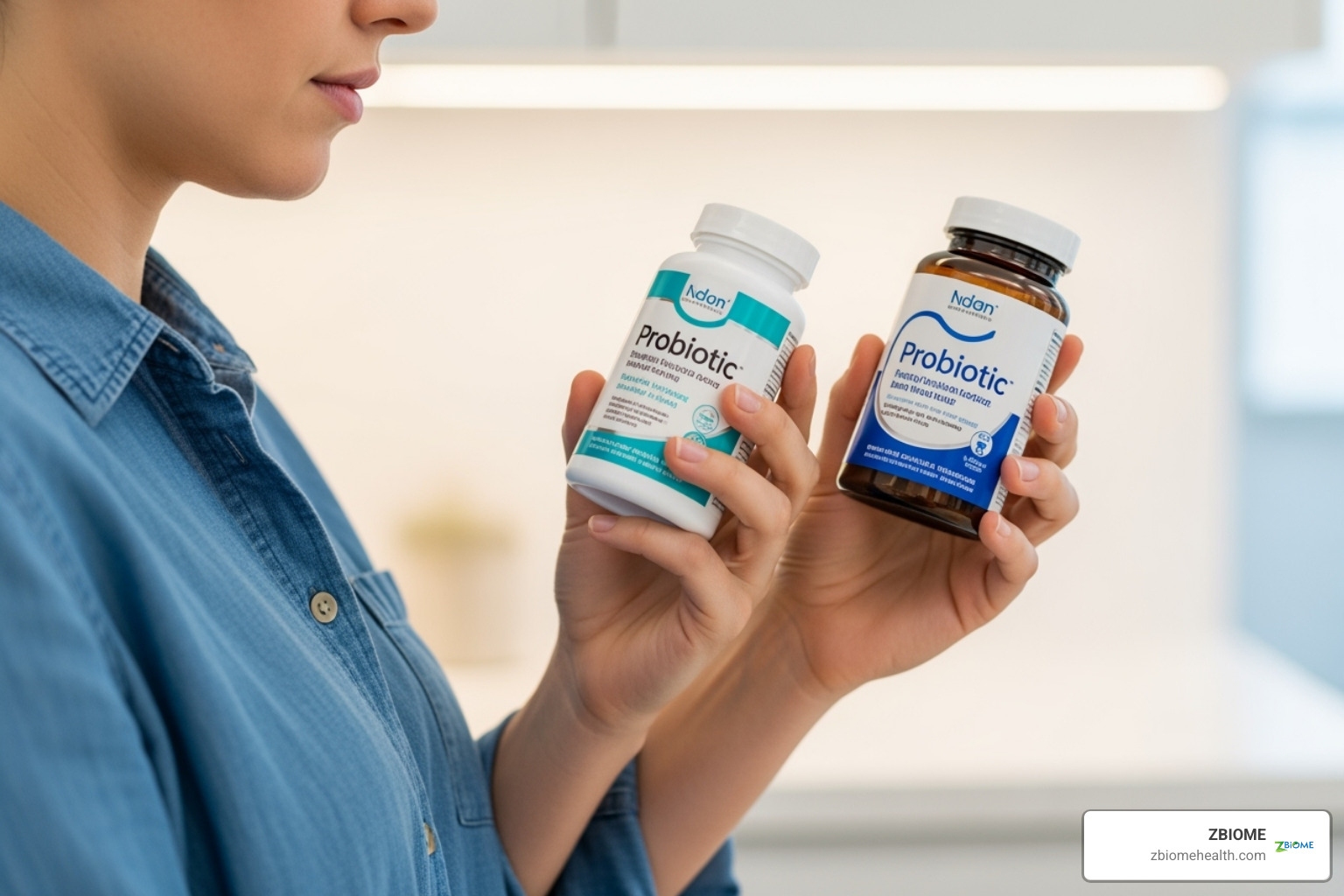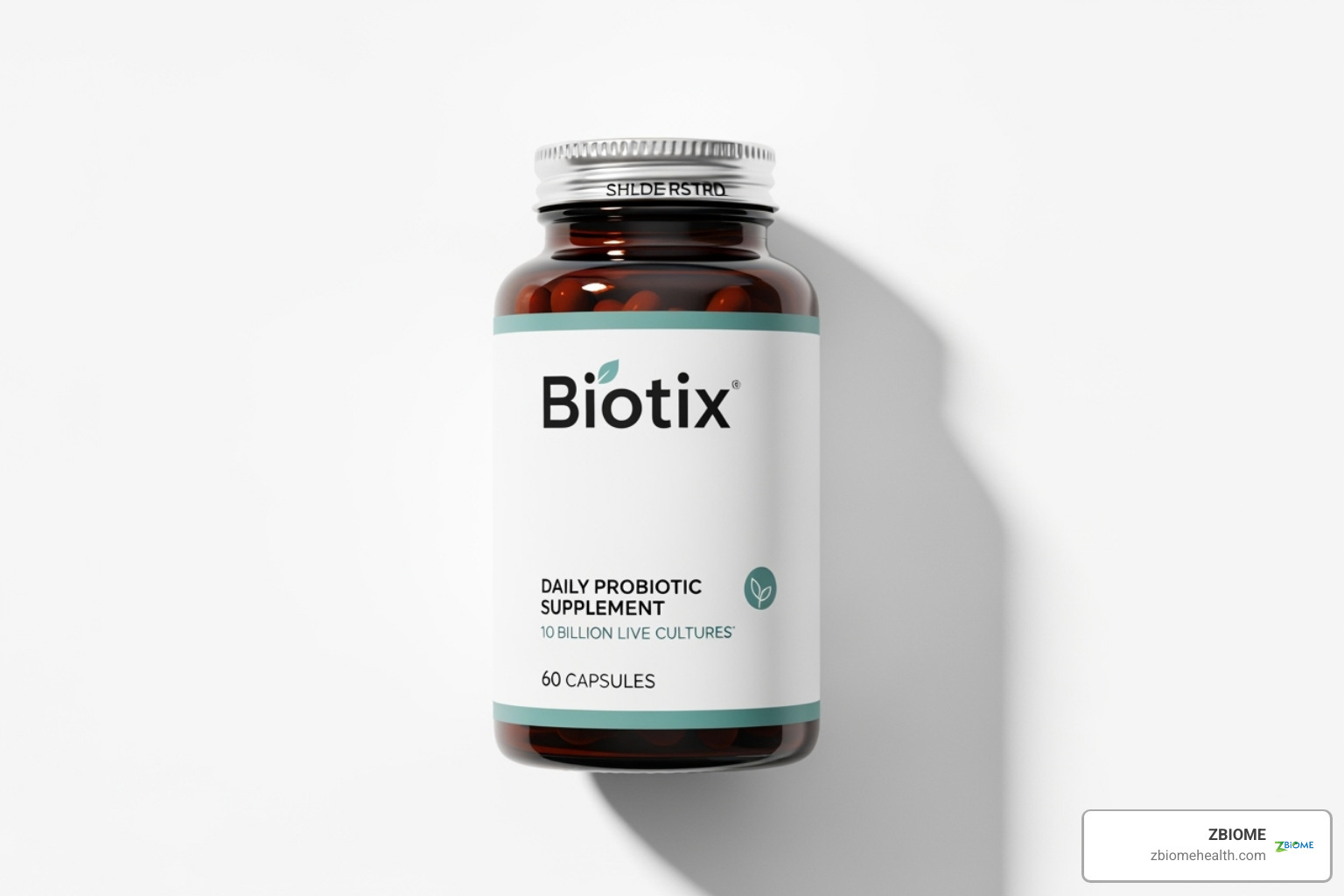Your Guide to Finding High-Quality, Affordable Probiotics
Finding the best value probiotic doesn't have to break your budget or compromise on quality. With probiotic prices ranging from $0.13 to $2.86 per day, smart consumers need to understand what factors truly matter for their gut health investment.
Top Best Value Probiotics for 2025:
- Most Affordable: Holland & Barrett Live Friendly Bacteria ($0.13/day)
- Best Budget High-CFU: Zipvit Pro-Bio 20 Billion CFU ($0.24/day)
- Best Overall Value: Vitl Daily Biotic ($0.50/day)
- Premium Value: ProVen Probiotics 25B ($1.20/day)
The probiotic market can feel overwhelming. Walk down any supplement aisle and you'll face dozens of bottles with confusing claims about CFU counts, strain names, and miracle benefits. Many people end up paying premium prices for products that don't deliver results, or worse, choosing the cheapest option that lacks the potency to make a real difference.
True value in probiotics comes from more than just price. You need to consider cost per billion CFU, strain diversity, third-party testing, and whether the product includes helpful additions like prebiotics or digestive enzymes. Some probiotics offer subscription discounts of up to 15%, while others provide better value through higher CFU counts at competitive prices.
I'm Tarek El Ali, a healthcare consultant with experience in pharmaceuticals and therapeutic development, including immunology research from Harvard Medical School. Through my work optimizing healthcare delivery and analyzing therapeutic outcomes, I've seen how choosing the best value probiotic can significantly impact both gut health results and long-term supplement budgets.

What Makes a Probiotic a Good Value?
Finding the best value probiotic isn't about grabbing the cheapest bottle on the shelf. It's about getting the most gut health benefits for every dollar you spend. Think of it like buying a car – you wouldn't just look at the sticker price without considering fuel efficiency, reliability, and features that matter to you.
The real value equation starts with cost per dose. That $10 bottle might seem like a bargain until you realize it only lasts 10 days, while a $30 bottle gives you a month's supply. We always calculate the daily cost to compare fairly. Probiotic prices can range from as low as $0.13 to as high as $2.86 per day – quite a spread!
Colony-Forming Units (CFU) tell you how many live bacteria you're actually getting. Most experts recommend 1-10 billion CFU per dose for general wellness, though some conditions may benefit from higher amounts. Here's the catch: those bacteria need to be alive when they reach your gut, not just when the manufacturer bottled them. Look for products that guarantee their CFU count through the expiration date, not just at manufacturing. Scientific research on CFU count shows that viability matters more than raw numbers.
Your gut is like a diverse ecosystem, so strain diversity matters too. Different bacterial strains do different jobs – some help with digestion, others support immunity, and some even influence mood. A probiotic with well-researched strains from both Lactobacillus and Bifidobacterium families typically offers more comprehensive benefits than a single-strain product.
Smart manufacturers add ingredients that boost their probiotic's effectiveness. Prebiotics act like fertilizer for your beneficial bacteria, helping them thrive once they reach your gut. Common ones include inulin and FOS. Digestive enzymes provide extra support by helping break down food so your gut can absorb nutrients better. Products combining these elements (called synbiotics) often deliver better results than probiotics alone.
Third-party testing separates the serious brands from the questionable ones. Since the FDA doesn't strictly regulate probiotics, independent lab testing is your best guarantee that what's on the label is actually in the bottle. This testing verifies CFU counts, confirms strain identity, and checks for harmful contaminants.
The delivery method can make or break your probiotic's effectiveness. Those bacteria need to survive your stomach acid to reach your intestines alive. Enteric-coated capsules, specialized packaging, and shelf-stable formulations all help ensure more live bacteria make it to their destination. For deeper insights on choosing wisely, check out our guide on 6 Crucial Factors to Consider When Choosing a High-Potency Probiotic.
How We Chose the Best Value Probiotic Supplements

We didn't just throw darts at a wall of probiotic bottles. Finding the best value probiotic supplements required a systematic approach that balances affordability with real health benefits.
Our evaluation started with the price per day calculation. This foundational metric lets us compare a 30-day supply fairly against a 60-day bottle, regardless of packaging tricks or bulk pricing. Some products that look expensive upfront actually cost less per day than seemingly cheaper alternatives.
We then calculated CFU per dollar to see how much bacterial power you get for your money. A product might have 50 billion CFU, but if it costs twice as much as a 30 billion CFU option, the math might not work in its favor.
Ingredient quality became our next filter. We prioritized products that list specific strain names (like Lactobacillus rhamnosus GG) rather than vague categories. We looked for beneficial additions like prebiotics and digestive enzymes, while marking down products loaded with unnecessary fillers or artificial ingredients.
Third-party testing and certifications acted as our quality checkpoint. Independent lab verification gives us confidence that what's promised is what's delivered. Certifications like GMP (Good Manufacturing Practices) signal that companies take quality seriously throughout their manufacturing process.
We analyzed customer reviews to understand real-world experiences. Patterns in feedback – whether positive or negative – often reveal truths that lab tests might miss. We balanced this with each brand's overall reputation and transparency in the industry.
Finally, we assessed the delivery method and stability to ensure the probiotics could actually survive the journey to your gut. Advanced capsule technologies, proper packaging, and stability testing all factor into whether those CFU numbers translate into real benefits.
Budget vs. Premium: Understanding the Trade-Offs
The probiotic market spans from wallet-friendly options to premium formulations that cost as much as a nice dinner. Understanding these differences helps you find the best value probiotic for your specific needs and budget.
| Feature | Budget Probiotics | Premium Probiotics |
|---|---|---|
| Price per day | Often lower ($0.13 - $0.50) | Generally higher ($0.80 - $2.86+) |
| CFU Count | Lower (1-10 Billion CFU) | Higher (20-100+ Billion CFU) |
| Strain Diversity | Fewer strains (1-5 common ones) | More diverse (10-30+ clinically studied strains) |
| Added Ingredients | Basic formulation, minimal extras | Include prebiotics, digestive enzymes, vitamins |
| Delivery Method | Basic capsules | Advanced delivery systems, enteric coatings |
| Third-Party Testing | Less common or unstated | Frequently tested and certified |
| Research Backing | Generic formulations | Extensive clinical research for specific benefits |
The main trade-off comes down to efficacy differences. Budget probiotics work well for general digestive maintenance, but they might lack the specific strains or potency needed for targeted health concerns. If you're dealing with antibiotic-associated diarrhea or IBS, you'll want specific, clinically-proven strains in adequate amounts.
Absorption and survival rates often separate budget from premium options. Advanced delivery systems in pricier products help more bacteria survive stomach acid and reach your intestines alive. A budget option might list impressive CFU numbers, but fewer might actually make it to where they're needed.
Premium probiotics typically offer comprehensive support through synbiotic formulas that combine probiotics, prebiotics, and sometimes digestive enzymes. This holistic approach supports not just bacterial introduction but also their long-term success in your gut ecosystem.
The key is matching your investment to your needs. For general wellness, a well-chosen budget option might be perfect. For specific health concerns, investing in a research-backed premium product could save money long-term by actually addressing your issues. To see how different approaches compare, check out our detailed analysis in Zbiome vs Seed.
Finding the Best Value Probiotic: Our Top Picks for 2025
Navigating the probiotic aisle can feel like a quest for the Holy Grail, especially when you're seeking both affordability and effectiveness. But fear not, fellow gut health enthusiasts! We've scoured the market to bring you our top picks for the best value probiotic options in 2025. These selections stand out for their blend of potency, quality, and price, ensuring you can support your gut without emptying your wallet.
Here are our champions for various needs and preferences:
Best for High CFU on a Budget: Nature's Zest Bio Cultures Advanced Formula
If you're looking for a serious punch of beneficial bacteria without the premium price tag, Nature's Zest Bio Cultures Advanced Formula is a strong contender. This probiotic delivers a whopping 100 Billion CFU from 12 different probiotic strains for a competitive price, making it a truly good value option.
At approximately $0.57 per day, it offers an impressive CFU count per dollar. The inclusion of diverse strains aims for comprehensive gut support, and being GMP (Good Manufacturing Practices) certified adds a layer of assurance regarding its quality. While the source doesn't explicitly detail which prebiotics are included, the "Advanced Formula" often implies additional supportive ingredients. This product is an excellent choice for individuals seeking high potency and strain diversity at a budget-friendly price point, demonstrating that you don't always need to spend a fortune for a high-CFU probiotic.
Most Affordable Daily Probiotic: Zipvit Pro-Bio 20 Probiotic 20 Billion CFU
For those who prioritize the lowest possible daily cost while still getting a respectable dose of probiotics, Zipvit Pro-Bio 20 Probiotic 20 Billion CFU stands out. Noted for its incredibly low price per day at just $0.24, this option makes daily probiotic supplementation highly accessible.
It provides 20 Billion CFU from 3 different probiotic strains, which is a solid starting point for general gut health maintenance. While it may not boast the extensive strain diversity of more premium options, its affordability makes it an ideal choice for beginners or those on a very tight budget who want to experience the general benefits of probiotics without significant financial commitment. It's a testament to the fact that effective probiotics can be found without breaking the bank.
Best Subscription Value: Seed DS-01 Daily Synbiotic
For those committed to long-term gut health and looking for a premium experience with cost savings, Seed DS-01 Daily Synbiotic offers exceptional value through its subscription model. You can potentially save up to 15% in the long run, making a high-quality product more affordable.
Seed's DS-01 is more than just a probiotic; it's a 2-in-1 synbiotic, combining 53.6 billion AFUs (Active Fluorescent Units) from 24 clinically studied strains with a prebiotic blend sourced from Indian pomegranate. This thoughtful combination ensures the probiotics have the fuel they need to thrive. What truly sets Seed apart is its commitment to quality and delivery: it's third-party tested for purity and potency, and uses advanced ViaCap technology to protect the probiotics as they travel through the digestive tract, ensuring they reach the colon alive and ready to work. While its upfront cost is higher, the subscription savings and the comprehensive, science-backed formulation make it a best value probiotic for those who see gut health as a long-term investment. For a detailed comparison of this premium option, you can check out our analysis of Zbiome vs Seed.
Zbiome: The All-in-One Best Value Probiotic

When it comes to truly comprehensive gut health support at an unbeatable price, we believe our own ZBIOME offers the best value probiotic on the market. We designed ZBIOME to address the common challenges consumers face: finding a product that is both effective and affordable, without compromising on quality or breadth of benefits.
Our ZBIOME gut health supplement is an all-in-one powerhouse, combining 60 Billion CFU probiotics from 10 diverse strains to support a balanced intestinal microbiota. We don't stop there. Recognizing the synergistic relationship between different gut health components, we've also included 9 digestive enzymes to aid in nutrient absorption and digestion, and 4 prebiotics to nourish the beneficial bacteria, ensuring they thrive.
What truly makes ZBIOME a best value probiotic is its comprehensive formula at an incredibly competitive price point of just $27. This significantly undercuts many competitors who offer fewer CFUs, strains, or lack the added benefits of enzymes and prebiotics. We are committed to providing science-backed ingredients, ensuring that every capsule delivers potent, effective support for your digestive, immune, and overall well-being. Our mission is to make optimal gut health accessible to everyone, and ZBIOME is our answer to that promise.
Getting Probiotics from Food: A Cost-Effective Alternative?

While searching for the best value probiotic supplement, you might wonder if your grocery store holds the answer. After all, humans have been fermenting foods for thousands of years, long before probiotic capsules existed. The good news? Fermented foods can absolutely support your gut health, and they might be easier on your wallet too.
Think of your local supermarket as a treasure trove of probiotic-rich options. Yogurt and kefir are probably the most familiar choices, packed with live bacterial cultures like Lactobacillus and Bifidobacterium. Kefir is particularly impressive, containing a wider variety of beneficial bacteria and yeasts than regular yogurt. Yogurt and kefir offer proven benefits for digestive health and beyond.
Then there's sauerkraut - fermented cabbage that's rich in Lactobacillus bacteria. Just make sure you grab the unpasteurized version from the refrigerated section, since pasteurization kills those helpful microbes. Kombucha, that fizzy fermented tea that's become trendy, provides a variety of bacteria and yeasts, though the specific strains vary between brands.
Don't overlook miso, a traditional Japanese seasoning made from fermented soybeans. It's loaded with beneficial microbes including Aspergillus oryzae. And yes, even pickles count - but only the naturally fermented ones preserved in brine, not vinegar. Again, look for the refrigerated varieties.
Here's the reality check though. While fermented foods are fantastic for gut health, they can't match the concentrated power of supplements. A probiotic supplement delivers billions of CFUs from specific, identified strains. Meanwhile, that serving of sauerkraut or yogurt? The CFU count varies wildly depending on the product, brand, and even the individual batch. You're getting probiotics, but it's hard to know exactly how many.
From a cost perspective, fermented foods often win hands down. A container of yogurt or jar of sauerkraut costs just a few dollars and provides multiple servings. Compare that to probiotic supplements ranging from $0.13 to nearly $3.00 per day, and fermented foods look like a bargain.
But here's what we've learned: it doesn't have to be an either-or decision. Fermented foods bring more to the table than just probiotics - they provide fiber, nutrients, and delicious variety to your diet. Think of them as your daily gut health maintenance crew. If you need targeted support for specific issues or want consistent, high-dose CFUs, that's where a quality supplement like our ZBIOME comes in as your specialized strike force.
The benefits of fermented foods extend far beyond just probiotic content, making them a valuable addition to any gut-healthy lifestyle, whether you choose supplements or not.
Frequently Asked Questions about Probiotics
We get it – starting your probiotic journey can feel overwhelming with so many questions swirling around. Let's tackle the most common concerns we hear from people just like you, so you can move forward with confidence in finding your best value probiotic.
How long does it take for probiotics to start working?
Here's the honest truth: there's no magic timeline that works for everyone. The speed at which probiotics start working varies significantly from person to person, and depends on several key factors including which specific strains you're taking, what condition you're addressing, and the overall state of your gut health when you begin.
For some quick wins, you might notice relief from antibiotic-associated diarrhea within just a few days. Certain powerhouse strains like Saccharomyces boulardii are particularly fast-acting when it comes to restoring gut balance after antibiotics have disrupted your system.
But here's where patience becomes your friend. For more comprehensive changes to your gut microbiome – the kind that support long-term digestive health, immune function, and overall wellness – you're looking at several weeks to really feel the difference. Think of it like tending a garden: you plant the seeds (probiotics), but it takes consistent care and time for them to take root and flourish.
Don't be surprised if you experience some temporary hiccups during your first couple of weeks. Many people notice mild bloating, gas, or changes in bowel movements as their gut adjusts to the new bacterial residents. This is actually a sign that things are shifting – your gut is rebalancing itself. These symptoms typically fade within two weeks.
The golden rule? Consistency is absolutely key. Just like you wouldn't expect to get fit after one workout, you can't transform your gut health with sporadic supplementation. Stick with your probiotic routine for at least 12 weeks to give it a fair assessment. For practical guidance on setting realistic expectations, check out our 3 Tips for Managing Expectations When Starting Probiotics.
Are more CFUs always better?
This is one of the biggest myths in the probiotic world, and we're here to bust it wide open. While those sky-high CFU numbers on labels might look impressive, more CFUs are definitely not always better.
Here's what actually matters: the effective dose is completely strain-specific. Each strain of beneficial bacteria has been studied at particular dosages to achieve specific health benefits. For most general wellness goals, research shows that 1-10 billion CFU is often perfectly sufficient and highly effective. Going beyond what's been clinically proven for a particular strain doesn't necessarily translate to better results.
Think about it this way – if you need one teaspoon of salt in your soup, adding five teaspoons doesn't make it five times better. It just makes it unpalatable. The same principle applies to probiotics.
What's more important than raw numbers is ensuring those CFUs actually survive the journey to your gut. A product boasting 100 billion CFUs but lacking proper protection from stomach acid might deliver fewer live bacteria to your intestines than a well-formulated best value probiotic with 20 billion CFUs and superior delivery technology.
Quality trumps quantity every single time. Focus on products with clinically studied strains at their proven effective dosages, third-party testing for purity, and proper formulation to ensure viability. For a deeper understanding of what truly makes a high-potency probiotic effective, dive into our comprehensive guide Beyond the Hype: Your Guide to Truly High-Potency Probiotics.
Who should be cautious when taking probiotics?
While probiotics are incredibly safe for most healthy people, there are certain situations where extra caution is warranted. We always encourage consulting with a healthcare professional before starting any new supplement, especially if you fall into one of these categories.
Immunocompromised individuals need to be particularly careful. This includes people living with HIV/AIDS, those undergoing chemotherapy, or anyone taking immunosuppressant medications. While extremely rare, there's a theoretical risk of infection from the live bacteria in probiotics when your immune system isn't operating at full capacity.
Critically ill patients or those with severe underlying medical conditions should also proceed with caution. If you're hospitalized, in intensive care, or dealing with conditions like severe acute pancreatitis, severe intestinal damage, or have central venous catheters, the risk profile changes significantly.
People with short bowel syndrome may find that probiotics could potentially worsen bacterial overgrowth, while those with a history of severe allergic reactions should be aware that reactions to probiotic ingredients, though rare, can occur.
For most healthy individuals, side effects are typically mild and temporary – think gas, bloating, or slight digestive changes during the first week or two. These usually resolve as your body adjusts. However, serious complications like systemic infections have been documented in extremely rare cases, almost exclusively in high-risk populations.
One important timing note: if you're taking antibiotics, space your probiotic dose at least two hours away from your antibiotic to maximize effectiveness.
The bottom line? Your healthcare provider knows your unique health situation best and can help determine whether a probiotic is right for you. For comprehensive safety information, you can review research on probiotic safety from trusted medical sources.
Final Thoughts on Finding Your Perfect Probiotic
Your journey to finding the best value probiotic doesn't have to end with confusion or buyer's remorse. Throughout this guide, we've peeled back the marketing layers to reveal what truly matters: cost per billion CFU, strain diversity backed by research, third-party testing for peace of mind, and those valuable extras like prebiotics and digestive enzymes that make your investment work harder for you.
The beauty of understanding these value factors is that it puts you in the driver's seat. No more falling for flashy packaging or sky-high CFU counts that don't deliver. You now know that a $0.24-per-day probiotic might be perfect for getting started, while a comprehensive formula with subscription savings could be your long-term gut health partner.
Balancing cost and quality isn't about finding the cheapest option—it's about finding the sweet spot where your budget meets your health goals. Sometimes that means starting with a budget-friendly option to test the waters. Other times, it means investing a bit more upfront in a science-backed formula that delivers multiple benefits in one convenient package.
Your best value probiotic is just one player on your gut health team. The most expensive supplement in the world won't work miracles if you're living on processed foods and chronic stress. A holistic approach to gut health means pairing your probiotic choice with fiber-rich foods, staying hydrated, managing stress, and keeping your body moving. Think of fermented foods like kimchi and kefir as your daily gut cheerleaders, while your chosen supplement provides the consistent, targeted support your microbiome craves.
We believe everyone deserves access to quality gut health support without breaking the bank. That's exactly why we created ZBIOME—to prove that comprehensive, science-backed nutrition doesn't have to come with a premium price tag. Whether you choose our all-in-one solution or another option from this guide, you're making an investment in your long-term wellness that your future self will thank you for.
Ready to dive deeper into optimizing your gut health journey? Explore our comprehensive resource: Open uping the Power of Zbiome: Your Guide to Probiotic Wellness and Gut Health. Here's to happy guts, healthy savings, and the confidence that comes from making informed choices!




